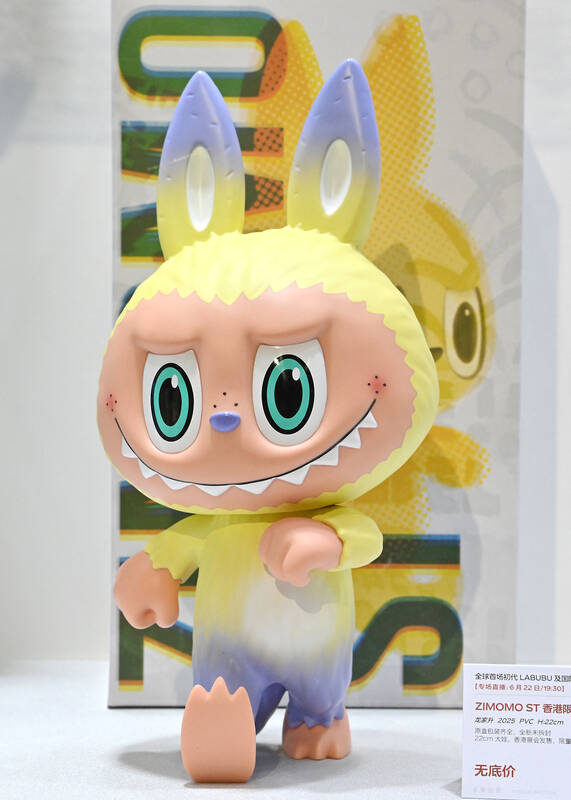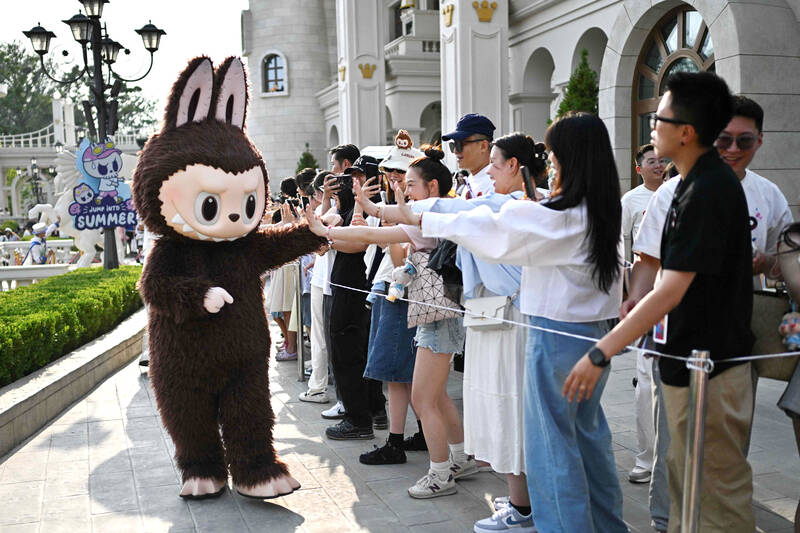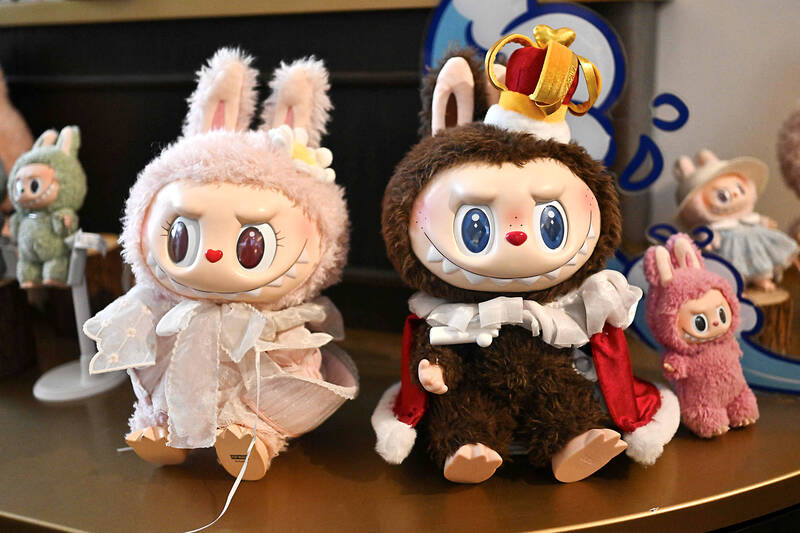Small, fuzzy and baring sharp teeth, Chinese toymaker Pop Mart’s Labubu monster dolls have taken over the world, drawing excited crowds at international stores and adorning the handbags of celebrities such as Rihanna and Cher.
Beijing-based Pop Mart is part of a rising tide of Chinese cultural exports gaining traction abroad, furry ambassadors of a “cool” China even in places associated more with negative public opinion of Beijing such as Europe and North America.
Labubus, which typically sell for around US$40, are released in limited quantities and sold in “blind boxes,” meaning buyers don’t know the exact model they will receive.

Photo: AFP
The dolls are “a bit quirky and ugly and very inclusive, so people can relate,” interior designer Lucy Shitova said at a Pop Mart store in London, where in-person sales of Labubus have been suspended over fears that fans could turn violent in their quest for the toys.
“Now everything goes viral... because of social media. And yes, it’s cool. It’s different.”
While neighboring East Asian countries South Korea and Japan are globally recognized for their high-end fashion, cinema and pop songs, China’s heavily censored film and music industry have struggled to attract international audiences, and the country’s best-known clothing exporter is fast-fashion Web site Shein.

Photo: AFP
There have been few success stories of Chinese companies selling upmarket goods under their own brands, faced with stereotypes of cheap and low-quality products.
“It has been hard for the world’s consumers to perceive China as a brand-creating nation,” the University of Maryland’s Fan Yang said.
Pop Mart has bucked the trend, spawning copycats dubbed by social media users as “lafufus” and detailed YouTube videos on how to verify a doll’s authenticity. Brands such as designer womenswear label Shushu/Tong, Shanghai-based Marchen and Beijing-based handbag maker Songmont have also gained recognition abroad over the past few years.

Photo: AFP
“It might just be a matter of time before even more Chinese brands become globally recognizable,” Yang said.
TIKTOK EFFECT
Through viral exports like Labubu, China is “undergoing a soft-power shift where its products and image are increasingly cool among young Westerners,” said Allison Malmsten, an analyst at China-based Daxue Consulting. Malmsten said she believed social media could boost China’s global image “similar to that of Japan in the 80s to 2010s with Pokemon and Nintendo.”
Video app TikTok — designed by China’s ByteDance — paved the way for Labubu’s ascent when it became the first Chinese-branded product to be indispensable for young people internationally.
Joshua Kurlantzick from the Council on Foreign Relations said that “TikTok probably played a role in changing consumers’ minds about China.”
TikTok, which is officially blocked within China but still accessible with VPN software, has over one billion users, including what the company says is nearly half of the US population.
The app has become a focus of national security fears in the US, with a proposed ban seeing American TikTok users flock to another Chinese app, Rednote, where they were welcomed as digital “refugees.”
A conduit for Chinese social media memes and fashion trends, TikTok hosts over 1.7 million videos about Labubu.
IMPACT ON CHINA’S IMAGE
Cultural exports can “improve the image of China as a place that has companies that can produce globally attractive goods or services”, Kurlantzick said.
“I don’t know how much, if at all, this impacts images of China’s state or government,” he said, pointing to how South Korea’s undeniable soft power has not translated into similar levels of political might.
While plush toys alone might not translate into actual power, the US’s chaotic global image under the Trump presidency could benefit perceptions of China, the University of Maryland’s Yang said.
“The connection many make between the seeming decline of US soft power and the potential rise in China’s global image may reflect how deeply intertwined the two countries are in the minds of people whose lives are impacted by both simultaneously,” said.
At the very least, Labubu’s charms appear to be promoting interest in China among the younger generation.
“It’s like a virus. Everyone just wants it,” Kazakhstani mother-of-three Anelya Batalova said at Pop Mart’s theme park in Beijing. Qatari Maryam Hammadi, 11, posed for photos in front of a giant Labubu statue.
“In our country, they love Labubu,” she said. “So, when they realise that the origin of Labubu is in China, they’d like to come to see the different types of Labubu in China.”

Google unveiled an artificial intelligence tool Wednesday that its scientists said would help unravel the mysteries of the human genome — and could one day lead to new treatments for diseases. The deep learning model AlphaGenome was hailed by outside researchers as a “breakthrough” that would let scientists study and even simulate the roots of difficult-to-treat genetic diseases. While the first complete map of the human genome in 2003 “gave us the book of life, reading it remained a challenge,” Pushmeet Kohli, vice president of research at Google DeepMind, told journalists. “We have the text,” he said, which is a sequence of

On a harsh winter afternoon last month, 2,000 protesters marched and chanted slogans such as “CCP out” and “Korea for Koreans” in Seoul’s popular Gangnam District. Participants — mostly students — wore caps printed with the Chinese characters for “exterminate communism” (滅共) and held banners reading “Heaven will destroy the Chinese Communist Party” (天滅中共). During the march, Park Jun-young, the leader of the protest organizer “Free University,” a conservative youth movement, who was on a hunger strike, collapsed after delivering a speech in sub-zero temperatures and was later hospitalized. Several protesters shaved their heads at the end of the demonstration. A

Every now and then, even hardcore hikers like to sleep in, leave the heavy gear at home and just enjoy a relaxed half-day stroll in the mountains: no cold, no steep uphills, no pressure to walk a certain distance in a day. In the winter, the mild climate and lower elevations of the forests in Taiwan’s far south offer a number of easy escapes like this. A prime example is the river above Mudan Reservoir (牡丹水庫): with shallow water, gentle current, abundant wildlife and a complete lack of tourists, this walk is accessible to nearly everyone but still feels quite remote.

In August of 1949 American journalist Darrell Berrigan toured occupied Formosa and on Aug. 13 published “Should We Grab Formosa?” in the Saturday Evening Post. Berrigan, cataloguing the numerous horrors of corruption and looting the occupying Republic of China (ROC) was inflicting on the locals, advocated outright annexation of Taiwan by the US. He contended the islanders would welcome that. Berrigan also observed that the islanders were planning another revolt, and wrote of their “island nationalism.” The US position on Taiwan was well known there, and islanders, he said, had told him of US official statements that Taiwan had not